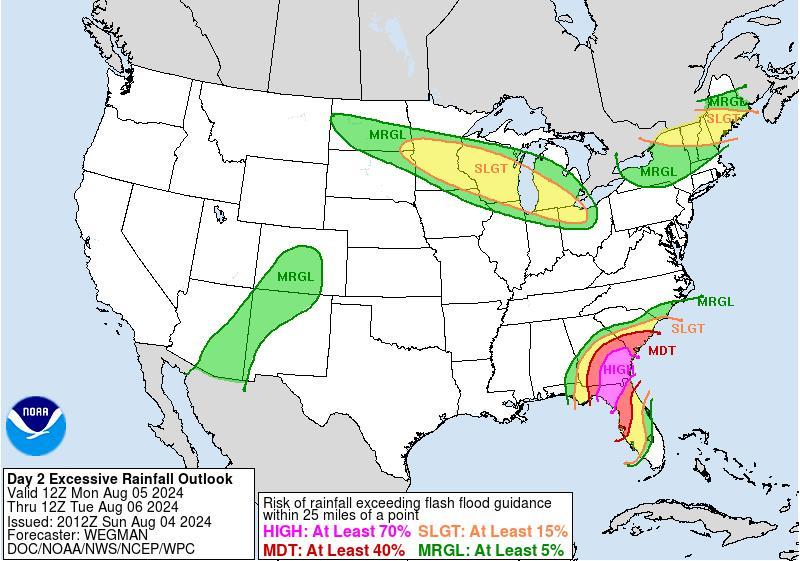
Section Branding
Header Content
Check here: Tropical weather resources for Coastal Georgia
Primary Content

Mary Landers, The Current
It’s a good time to review where the best local information on tropical weather and emergency planning resides. Listed below are sites and sources we at The Current look to in each of the coastal counties and at the national level.
Each county operates an emergency management agency that will provide information and warning specific to that county. EMAs typically collaborate with the municipalities within their county as well as with state leaders in issuing guidance on storms, including evacuation orders. Most also operate programs, such as Code Red or CEMA Alerts, that allow residents to sign up for email or text updates.
First on any list are the forecasts and warnings from the National Oceanic and Atmospheric Administration. NOAA provides regular updates on storms, with plain language explanations as well as multiple graphics showing expected effects. Find it at https://www.nhc.noaa.gov/
If you prefer Facebook, NOAA operates a page there, too.
Check these resources for more information about tidal flooding in Georgia:
• NOAA provides several resources on coastal flooding, including the NOAA Coastal Inundation Dashboard, which provides real-time water levels with forecasts out to 48 hours for all tidal stations.
• NOAA’s high tide flooding report allows comparison of the number of tidal floods each year at each tide gauge. It also provides predictions of the flooding expected in the future. Georgia has only one NOAA tide gauge, at Fort Pulaski near Savannah. The closest gauge to Brunswick is in Fernandina Beach.
• The Smart Sea Level Sensor Dashboard maps out its sensors and provides real time data about water levels (and other environmental parameters such as temperature, humidity and barometric pressure) at more than 60 sites, mostly in Chatham County, but extending south to Camden.
For straight talk about what to expect as a hurricane approaches, many Savannah-area residents rely on Chuck Watson, a native Savannahian and hazards researcher who knows both tropical weather and Coastal Georgia well. Watson’s wry take on every situation (“You’re doomed. Here’s why …” is his tagline) somehow makes bad weather better. Watson writes a blog available on his Enki Research website. He updates frequently as storms approach. The blog contents are typically repeated on his Facebook page. Or subscribe to his emails at this link.
Links to the six coastal EMA websites and/or their Facebook pages follow:
Chatham Emergency Management Agency
Chatham Emergency Management Agency Facebook
Bryan County Emergency Services
Bryan County Fire & Emergency Service Facebook
Liberty County Emergency Management Agency
Liberty County Emergency Management Facebook
McIntosh County Emergency Management Agency
McIntosh County Emergency Management Agency Facebook
Glynn County Emergency Management Agency
Glynn County Emergency Management and Homeland Security Agency Facebook
Glynn County Emergency Dashboard (An interactive program that helps users understand potential storm surge and National Hurricane Center Advisories.)
Camden County government makes posts on behalf on its EMA on Facebook
Camden County Emergency Management Public Information Hub
Get alerts now so you’ll be ready later
Coastal residents can sign up for county-specific emergency alerts. This system is used to send critical communications during emergency situations such as evacuation notices, hazardous weather alerts, and missing children alerts. The information you provide during enrollment remains private and is only used for emergency communication purposes.
Click on your county to sign up for alerts from your emergency management officials: Chatham County, Bryan County, Glynn County, Liberty County, Camden County, McIntosh County.

Hurricane Registry
The Hurricane Registry is a list maintained by the eight counties in the Coastal Health District: Bryan, Camden, Chatham, Effingham, Glynn, Liberty, Long, and McIntosh. The list includes residents with functional needs or healthcare conditions that limit their ability to travel independently and require paratransit or similar transportation services (and have no other resources such as family members, neighbors, or friends) to help them evacuate if a hurricane is threatening. Residents must apply to be on the registry. Those who meet the criteria and are placed on the registry will be evacuated when there is serious threat of a hurricane. Residents may apply for the Hurricane Registry up to 72 hours prior to the arrival of tropical storm force winds. To apply call 1-833-243-7344. A representative will take some basic information and then your local health department will follow up with you to complete the application.
Find more information including an online application link here.
This story comes to GPB through a reporting partnership with The Current.

